Fishbone Is For The Children!
Taking my daughter to a Fishbone show completed one circle in my circle of life.
On December 13, 2023, the members of Fishbone were generous enough to do a whole show at 4:15 just for kids and parents.
Our six-year-old daughter is always bummed that rock shows happen after her bedtime. “Why are your shows always so late?” she said a year ago. “It’s not fair!” I told her I’d find her some shows to see.
So one summer when she was five, I got us all tickets to see The Shins play Oh, Inverted World in a downtown amphitheater called Pioneer Square. That outdoor series of summer shows start early enough for kids to attend, even though our kid still got to bed at 10. She insisted we stand close to the stage, and she stayed on my shoulders most of the show, swaying and clapping like the rest of us lunatics. She seemed genuinely moved by the experience, especially by the opening band Joseph. They were a group of three Oregon sisters with the most haunting, incredible harmonies. That was Boo Boo’s first adult concert.
The next summer we took her back to that place to see Patti Smith play. It was 100 degrees, and Boo still loved it.
The Shins are great, but they’re sedate. I wanted her to feel her rock ‘n’ roll with something soulful and wild.
Then out of the blue this December comes this ripper a couple hours before it was time for dinner. Fishbone: what a band to be her first big indoor rock concert.
I’ve been seeing Fishbone play since I was 16, and at age 48, I still love them as much as ever.
The fact is, Fishbone is one of the most brilliant bands to ever come out of America. Their main singer, Angelo Moore, is one of the greatest frontmen in rock music. And Fishbone, more than any of my school classes, really awoke me to racism in America.
Fishbone started in 1979 and had their greatest fame in the late-80s early ’90s. They famously combine ska, punk, reggae, funk, heavy metal, dub, soul, blues, hip-hop, and jazz into a style that transcends style.
“I’ve seen ’em do every style,” bassist Mike Watt said, “in the same song!”
Back in the day, you couldn’t miss them. They were loud. Their performances were eye-catching. They dressed differently. They moved differently. They had crazy song titles like “V.T.T.L.O.T.F.D.G.F.” aka, “Voyage to the Land of the Freeze-Dried Godzilla Farts,” and catchy sing-alongs that somehow worked like “U-G-L-Y, you ain’t got no alibi, you’re just ugly!” Their biggest hits, “Everyday Sunshine” and “Sunless Saturday,” were earworms that had you singing and dancing at once.
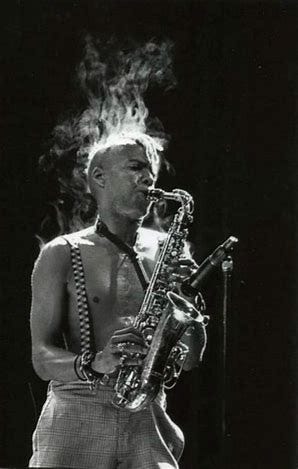
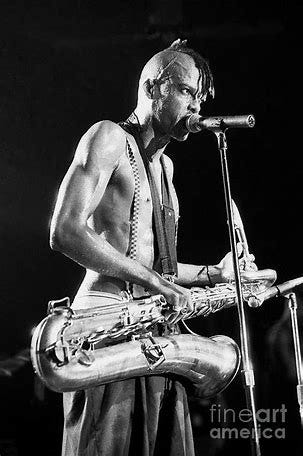
Their music is uncategorizable, and they wanted listeners to experience music beyond categories as much as they wanted listeners to eradicate racism. “There is no color to music,” Angelo told one interviewer in 1989. “They have Black radio. They don’t call it white radio. Rock ‘n’ roll is Black. Rock ‘n’ roll is white.”
Black people created America’s original musical forms: blues, jazz, soul, rock ‘n’ roll, funk. But for Fishbone, being proud of that Black artistic heritage didn’t mean you limited yourself to existing styles or that you should fear creating new ones.
“We are a Black band,” founding guitarist Kendall Jones told that 1989 interviewer. “That’s just the reality of it. We choose to play whatever music styles because we want to. We still have that Black consciousness with us, and that’s something that’s gonna always be. The whole thing is just getting people to understand that you’re not limited to a certain style, you know?”
The seminal punk band Black Flag wanted to destroy narrow ways of thinking, too. “We’re trying to always make a statement that it doesn’t matter what you’re wearing,” guitarist Greg Ginn told one interviewer in 1983. “It’s how you feel and how you think.”
For Black Flag it was all about narrow ideas of what “punk” music is and about artistic freedom, not about race or genre itself. But the issue of skin color also deeply informed Fishbone’s music as much as it made them pioneers.
“Weren’t too many bands that looked like us,” Angelo said of their early days. Bad Brains was a Black band who formed in 1976 and played punk rock and reggae. The all-Black rock band Living Colour formed in 1986, and the metal-rap-rock band 24-7 Spyz formed in 1986. By virtue of their era, these four bands were lone wolves disolving stereotype. “Black people ain’t supposed to play rock. That’s not the stereotype. Black people are supposed to play R&B and funk and soul. If you got dreadlocks, you supposed to be playing reggae.”
In the late 1980s and early 1990s, American record companies weren’t equipped to market Fishbone to both Black and white audiences, just like white America were ill-equipped to comprehend, or even accept, Black musicians playing what Fishbone played. But that wasn’t Fishbone’s problem to solve. They refused to concern themselves with genre.
“We wanted to be known as individuals,” Dirty Walt said in the documentary Everyday Sunshine, “not as cats belonging to a neighborhood. We wanted to be known for playing music.”
So as hard as it was, that’s what they did. In the process, their openness and fearlessness empowered countless people to follow their own path and not get boxed in—especially Black people. “I hear from a lot of people of color say, ‘You guys made it okay for me to feel like it was alright to be Black and rock,’” said Angelo. “I hear that a lot.”
There’s their music. There’s their influence. Then there’s their technical abilities.
You can’t overlook what incredible musicians these guys are. They’re so tight as a band, they play so many instruments, and they’re so precise in performances with so many moving parts.
During a single performance, Angelo alone will play alto sax, baritone sax, tenor sax, piccolo sax, clarinet, contrabass, keyboard, and theremin. Watching him dance and sing with a horn strapped to him is incredible, but watching him switch horns and get the mic into position while dancing and singing is a show unto itself. Angelo is one of the greatest artists of his generation: singer, dancer, musician, songwriter, MC, all at once. And Angelo is just one of six members.
You’ve got Chris Dowd, playing keyboard and trombone, singing and dancing and writing songs. (Watch him toss his trombone over his head and how the stage tech catches it.)
You’ve got Norwood, one of the greatest bassists of all time, who also sings and writes music.
You’ve got their tight, versatile drummer John Steward, keeping time in songs that stretch the fabric of time, in sets that move fluidly between genres.
A series of brilliant guitarists have brought the band different flavors, including a guitarist who played with Miles Davis, and their original guitarist Kendall Jones, who wrote songs and played ska and heavy metal equally well.
And you’ve got Dirty Walt—or as he’s introduced himself, “OG Dirty Walt, aka Walter Kibby II, Dog King of the Freaks from Fishbone, Year of the Dragon, and Columbus Sanatation.” He’s the dude in sunglasses who dances like a motherfucker and talks to the crowd, plays trumpet, sings harmonies, strengthens choruses, punctuates moments, keeps the crowd juiced (“One more time, ya’ll!”) and brings comic relief.
“Hopefully ya’ll take part in cleaning up your damn house so your parents don’t live in a goddamn rat hole,” Walt told the crowd before “Housework” in 2022. “I ain’t joking! There’s some dirty motherfuckers around here, and they need you goddamn kids to help out! I’d get my ass beat if I didn’t listen to my mamma. Go ahead, Chris. Kick this shit!”
But then, the way Walt and Angelo lock in on stage, singing and playing horns together makes one of the most dynamic musical combinations of all time.
To me, Fishbone represents Black genius, fully on the level of Miles Davis and John Coltrane in terms of spirit, imagination, and originality.
“A great piece of the past,” said Chuck D of Public Enemy, “a great deal of the present, and they’ve always been in the future.”
Then there’s the fact that they’re one of the world’s greatest live bands.
Of the countless bands that I’ve seen play, Fishbone is the band I’ve seen play almost more than any other. (It’s Calexico, Fishbone, then Thee Oh Sees.) There’s no bad Fishbone show. They bring it no matter the size of the crowd. In fact, I saw them play a parking lot in Tempe, Arizona in 2009. They’d been struggling as a band—suffering what now was clearly their downslide—and only two of the original members were still in it: Angelo and Norwood. Even though certain songs sounded thin without Walt and Chris’s vocals, they performed like they were still playing for thousands of people in the early ’90s. Their keyboardist literally did a handstand on the security barrier, paused for a moment with his feet in the air, then flipped backwards into the audience. The thing is, there was barely anybody in the audience, but the few hands that went up kept him from hitting the pavement. Like I said, they always bring it.
Based on their musical talent and uniqueness alone, they should have been one of the most famous bands in the world. Even the world-famous Red-Hot Chili Peppers, who Fishbone influenced, said so. But at the height of Fishbone’s fame, people could still ignore them.
Lots of people who grew up in the ’90s knew Fishbone but said they “never really got into them.” People who didn’t like ska could dismiss them as a ska band. People who liked ska might not dig their heavier songs. People who liked their silly songs might not like their serious songs. If you heard a super loud chaotic song, it might not resonate enough to make you want to hear more of their music. Their stylistic range meant their sound didn’t always cohere for some people. Because there were so many members running around on stage, and so many different instruments and voices, they were just too much for mainstream America. And yet, their too-muchness is a reason they’re one of the greatest bands on Earth. And in that same way, they embody America’s greatest strengths: diversity, originality, tension between different elements, glorious discordant mutts.
After four decades as a band—and countless ups and downs as influencers surviving on the edge of celebrity—Angelo summarized his approach to life: “It’s all about being optimistic. In the face of adversity, you always gotta be optimistic. When you’re an innovator and a creator, you always got people telling you ‘no,’ rejecting you and ridiculing you, but you have to keep going through with your dream, so you can get to the other side where the light is.”
Bad Brains brought the idea of P.M.A. to the world, and Fishbone internalized it. “You gotta drop P.M.A. in everything,” said Angelo, “how else you gonna continue to do your music if you don’t have a positive mental attitude?”
That’s why it was such a thrill to share them with my daughter.
I’d been priming her for two years.
Ever since she turned four, I’d been playing her Fishbone. We danced in the kitchen to “Skankin’ to the Beat.” We danced in the living room to “Party at Ground Zero.” We watched videos of their live performances together.
She’d never seen stagediving or crowd-surfing before.
She asked: How can Angelo roll on top of the audience’s heads like that?
How can he jump off a wall and not crush the people he landed on?
How can he dance so crazy and not fall down?
I explained.
So this December, she was psyched to see them in-person.
Can we dance? Yes!
Will they play skank to the beat? Yes!
Can my friends come? Absolutely!
Will he crowd-surf? Probably not.
When I picked her up from first grade that day, she told her friends, “We have to leave, because we’re seeing a band show.” And we hustled off the playground.
Of course, this show had a gravity that I couldn’t fully convey to her. Here in my middle age, I was sharing a band with my first-grade daughter that I have loved since high school. Fishbone’s kid’s show was designed to raise money for musical education, but for many Gen X parents like me, this show was a bridge across time and generations.
There was also her brush with music legends.
Kids are extremely smart. They’re naturally attuned to everything. But you can’t expect a first grader to appreciate how special a band or artist is. Certain ideas don’t fully register until you get older, and this Fishbone encounter would be one of those things. I still wanted her to have the experience.
Because one day when she’s older, I wanted her to know that this mattered so much to her dad that he took her to see them when she was six years old, and that she could always say “I saw Fishbone play once.” And when she lives a life of love and openness and cultural awareness as vast as their music, she can think about Fishbone as one of the greatest things about this incredible and messed up place we call America.
And even if the music never grabs her when she’s older, I want the band’s spirit to show her the way forward in her own life, for their MO to give her permission to not only dance, but to be original, uncompromising, driven, loving, determined, rebellious, socially conscious, free-thinking, and more concerned with humanity than categories.
To me, Fishbone is that big.
She drew the band a picture as a gift.
She’s very into Taylor Swift right now. While we drove to the show, she asked me, “What would happen if Angelo married Taylor Swift?” I said that was an interesting question. We’ll see him there, so you should ask him. She said she didn’t want to. I offered to ask him for her, but she insisted: no. Then when we got to the show, Angelo was setting up his merch table, putting out books, prints, and CDs, along with his mailing list.
A mother was there with her two kids, one in kindergarten, one in fifth grade. The fifth grader told Angelo that he played trombone and played jazz. Angelo encouraged him, saying that’s a hard instrument, man, but if you can carry around a ’bone, you can carry any instrument. “Of all the different music I’ve played,” Angelo told him, “jazz is probably the hardest. Keep going.”
Vivian and I started talking with him too. I bought a CD, and she gave him her drawing. Angelo thanked her and stood it in his suitcase full of records and t-shirts.
Then Vivian whispered to me, “Ask him the question.”
“Angelo,” I said, “my daughter here wants to know what would happen if you and Taylor Swift got married.”
Angelo laughed. “Taylor Swift and me?? Wow man, okay.” He scratched his chin dramatically, staring away while gathering his thoughts. “What would happen? Hmmm. Let me think. Well, I guess we would come together and make a whole new genre of music, mixing pop and punk and ska, sprinkled with that Taylor Swift and Fishbone magic. So, we’d make a whole new genre.”
Vivian nodded her head while we all gauged her reaction.
When I asked if he’d take a picture with her, he lifted her up on the table like a baritone sax.
I could hardly resist asking him for a photo with me, but I did. He needed to get back to the merch table, and I didn’t want to get in the way of his work.
When I asked many of Vivian’s friends’ parents to join us, everyone was too busy. Thankfully, two of her elementary school friends joined us with their mom, and the three girls danced and ran around the venue while the band played an hour-set, filled with the kind of songs they’d play at the adult show that night.
Families surged up front when Angelo addressed the crowd. “What’s goin’ on?” People cheered. “Well, I’m glad you could make it out to the matinee. You know we’re doin’ it for the kids! We’re gonna do a little song about Santa Clause. A song about Santa Clause, my version of Santa Clause, actually.”
Then they opened with an a Capelo “Slick Nick, You Devil You.”
I saw Slick Nick fall over the Christmas tree
He was a whole different man from
What mom and dad told me
Spillin’ Jack Daniels all over the drapes
Spray-painting a bad finger over the fireplace
Tatoos on his arms and knees
I never thought Santa Claus would be such a sleaze! But...Slick Nick, you devil you...
After that song, Vivian asked me why Santa broke the toys. Angelo’s just singing a funny version of a Santa song, I explained, one where Santa’s a sloppy, selfish jerk who drinks Scotch and grabs his jock.
Vivian said, “What’s a jock?”
“It’s another word for a man’s crotch.”
She laughed. She’d already learned the names Weiner and jellybeans for the parts of the male anatomy we’d taught her to kick in an emergency.
“Jock,” she said smirking.
“That’s right. Jock”
We’d told her Santa was made up years ago.
They didn’t tone the set down for the kids one bit. Angelo and Chris introduced “Alcoholic” as “a song about your parents.”
Walt sang his anti-Christmas jam “Just Call Me Scrooge.” After that one, my daughter asked why Walt didn’t like Christmas.
And they didn’t turn the sound down either. That shit was loud. They were raising money for children’s musical education, but it was like they were also saying, Welcome to the world of rock ‘n’ roll, kids. Bring earplugs.
They played “It’s a Wonderful Life” and the beautiful “Iration” along with crowd-pleasers “Skankin’ to the Beat” and “Party at Ground Zero,” and us middle-aged parent fans seemed to dance more than anyone.
Between songs I yelled “Dirty Walt!” He laughed on stage and looked around like, Who said that? Then he called back to the audience “Hi!” Vivian came over to me grinning and said, “He called back! He called back to you!” Dirty’s the best, I said.
I am so grateful to Fishbone for letting me share them with Boo Boo. And meeting Angelo, Chris, and Dirty Walt was just a total treat for a now-bald OG fan. What can I say? Dirty Walt rules, man.
And the kids dug it. This one was for the kids! And for us Gen Xers.
Then after dinner with my family, I went back that night to see them play the adult show. Two Fishbone shows in one day: my dream come true. The night show slayed, as they always do.
I don’t know what Fishbone song I heard first, but whatever it was grabbed me and never let go.
My first encounter was probably watching the band jump playing “Jamaica Ska” in Annette Funicello and Frankie Avalon’s 1987 movie Back to the Beach.
More than anything else in that cornball movie, this weird band stuck with me. Who were they? I had to know more.
By the time Fishbone played their infamously energetic versions of “Sunless Saturday” on Saturday Night Live and the Arsenio Hall Show in 1991, I was hooked. They released their album The Reality of My Surroundings that year, and their upbeat song “Everyday Sunshine” played constantly on MTV when my friends and I were in high school.
My good friend Chris was into Fishbone, because his older sister had turned him on when he was a kid. She even took him to see them play a show on the grass near the dorms of the Arizona State University campus, on their 1989 Truth and Soul tour. He and I fed off each other’s fandom.
The Reality of My Surroundings is one of the true masterpieces of ’90s music.
Infectious, original, surprising, confusing—the songs on Reality have a range of style, subject, and structure that few albums do. They cover brainwashing and racism, geopolitics and addiction, parent-child relations and the quest for positivity in a bleak world. Where else could you hear heavy metal double bass drum at the end of a ska song? Or tinny barrelhouse piano during the Grunge era? Before ‘diversity’ became a rallying cry for progressives and a corporate value, Fishbone embodied it.
The album contains the band’s biggest hits and live staples: “Everyday Sunshine,” “Sunless Saturday,” “Pressure,” and “Housework.” (“Wash them cloths, sweep that roof / Cut that lawn, wash the dishes / Hey!”) It’s easy to focus on them and the anthemic first song “Fight the Youth,” but you can’t ignore the funky fireball “So Many Millions.”
Your education will do me no good
In my neighborhood
All that I see is scrapin' and scrounging
In my neighborhood
If you can show me how to do good
In my neighborhood
And you can’t ignore the infectiously grooving “Naz-Tee May’en”, whose music always stays in my head for days after playing it.
Reality also contains one of my all-time favorite Fishbone songs, “Behavior Control Technician.” That song has so much feeling, and so much power, and Angelo just sings the hell out of it, pushing that liberating message about conformity and control into your ears while Dirty Walt weaves in his spoken lyrics, before they blow their horns together.
Train my brain to work, the way you want me to!
Don’t question authority, see, be a little zombie that agrees with you
You are strapped with a double standard cup in a battle you won’t win
And when it’s over we’re gonna dance your memory away!
What an absolute killer.
Unlike many Fishbone songs, bassist John Norwood Fisher and his drummer brother Philip “Fish” wrote this one together.
Through all of its horns, guitars, and unhinged elements, you can always hear the church’s influence on Angelo’s singing. “It’s all soul music” Angelo once said. “I do everything with soul, even if it’s punk rock, man, cause without gospel music, I couldn’t sing my punk rock like I do. Right? So it’s all soul music.”
On Reality, Dirty Walt contributes a spacy, comical, metaphorical song called “Babyhead” that’s the weirdest song about sex you’ll ever hear. (“Nougat wants that goo / Chocolate’s paralyzed and can’t move.”)
The band peppers the album with a series of four, brief song sketches, too, called “If I Were A… I’d” where Angelo and Walt pontificate to fast music on a range of subjects:
If I believed everything I saw on television I’d...
Think like Brady Bunch
Eat Wendy’s for lunch
Drive a Datsun Subaru and never question much
Get a 9 to 5, never have a life
Married at 20 have 2 kids then divorce my wife
Then I’ll be a cop! And I won’t be stopped
Power trippin’ robot just chewin’ off your ear!
And
If had a choice I’d...
Buy myself a gun, dress up like a nun
Kill the KKK and consider it some fun
Get a mob together, overthrow the show
Majority minority all the same as one!
No more politicians! No more crooked cops!
Unity against them they’ll just have a loss.
That series makes the album feel like a kind of theater, with these numbered interludes calling back to different parts of the show while connecting them together thematically.
So much of the album’s songs about conformity, authority, liberation, and oppression were informed by their experience as Black people in America—especially in Los Angeles, once home to the most crooked cops in America, and the city where, a month before Reality came out, four armed white cops beat the unarmed Black driver, Rodney King, close to death and reminded the world that racism still ruled America. Rodney King’s beating only made Reality more pressing.
But it’s Fishbone, so dark and deep play side-by-side with fun and danceable, because as dark as life is, Fishbone always celebrates the light, too. Between songs, they cleanse your confused palate with a two instrumental interludes, like “Asswhippin’” and the jazzy, dark, circus waltz “Death March.”
In the early 1990s, Reality provided joy and variety during a time when Alice In Chains and Pearl Jam filled kids’ ears with the heavy Grunge thing. I loved that dark guitar stuff during my second half of high school—I was all about it—but it could feel oppressive.
So from The Reality of My Surroundings, I went backwards into Fishbone’s catalogue.
The Fishbone EP and In Your Face were fun, but in 1992, when I drove to my early morning shifts at Subway Sandwiches, I usually roused myself by blasting their 1988 album Truth and Soul.
Cruising across the Pima Indian Reservation near my house, I sang along to the fast songs “Ma and Pa,” “Question of Life,” and “Bonin’ in the Boneyard” while cursing my brainless job.
I sang those words at the top of my teen lungs, over and over, energized by that positivity:
The new age, not the winter
The ice age was the last page
You must present a P.M.A.
For we all dance for freedom’s sake
Shake, shake, shake...
Shake, shake, shake...Oh, to tie the shoelace of life in place
To change the mind from a negative state
Yeah!
The band’s record label, Columbia, was pushing them to write more approachable pop songs that could become hits. That wasn’t Fishbone. They wrote what they wanted, and because of that, Truth and Soul became another masterpiece that challenged conventional ideas of what albums could be and breathed new life into the early ’90s “alternative” era.
You can’t help but love the music in “Ma and Pa,” but the lyrics were biting social commentary of broken families and the psychological effects of divorce on children.
Well, there’s lots of money
For all the attorneys, woah, yes
Not just a fight for child custody
’Cause Ma and Pa’s revenge is making little sister bleed
Fussin’ and a-fightin’ through a family life
Although Fishbone had a depth of soul and broad influences, their presentation could make them appear to be a silly band. When recording Truth and Soul, their guitarist Kendall Jones was concerned about that, so he pushed them to write more serious, socially conscious songs. He also added heavier, metal elements to their music that greatly expanded their range from ska, funk, and punk. It was those serious songs on Truth and Soul that awoke me to the Black experience in America.
The songs “Slow Bus Movin’,” “Ghetto Soundwave,” and “Change” affected me more deeply than anything that I learned about MLK, Civil Rights, and the Antebellum slave economy in school, because they humanized Black Americans. You could feel their experience in the music and singing. You could hear Black pain, Black endurance, and the Black experience in our racist country. And the way they made art from this was proof of Black genius.
Angelo discussed the origins of Truth and Soul songs:
Slow Bus Movin’? “Racist bullshit inspired that song.”
One Day? “Waiting for that special day to come along where everything will be good, right, and fair.”
Musically, “One Day” was a jam, but its lyrics penetrated you in such a subtle, unforgettable way.
Waitin’ for the one day
Are we waitin’ for the one day?
Waitin’ in bootcamps
In the country somewhere!
Waitin’ in front of TV’s in living rooms
Somewhere around here!
Waitin’ in heaven
Uh, uh, uh, somewhere up there...
Waitin’ in hell
Somewhere down there...
Dirty Walt wrote “One Day” with guitarist Kendall Jones. Even though Walt could write trippy sex songs like “Babyhead,” he had the ability to knock you over with lyrics like these, too.
As a ’90s kid, I’d never heard anything like “One Day” and “If I Were A…I’d.” I knew about racism. We learned about it in school. As a Jew, I’d also been called horrible names, and I knew about the Holocaust and Europe’s violent ethnic cleansing called pogroms, which took my own relatives’ lives. Growing up in Arizona, I also knew about the casual racism any brown, Spanish-speaking person suffered all the damn time. Racism wasn’t news to me. What really drilled this all deep in me were the feelings of sadness and tragedy in Fishbone’s voices. The lyrics told one story, but the musician’s vocals and harmonies told another. Feeling penetrated differently than formal lessons. In that way, Fishbone was my primary education about race in America.
As a teenager, Fishbone’s humor and weirdness spoke to me.
We subcultural kids felt like freaks. Now here the freaks were on stage killing it. It felt good to have role models. It felt good to have a tribe. Fishbone validated my inner weirdo. They were just so damn funny. And crazy. And spazztic. But they were also intelligent and talented. That combination was exactly what my wild teen rebel self needed back then. And then, like Mary Poppins using her spoonful of sugar to make the medicine go down, Fishbone poured all these enlightening songs down our throats, dosing us listeners with messages about racism, poverty, Fascism, ignorance, group think, Blackness, the police state, social decay, and America itself—plus a little Curtis Mayfield. I don’t know how much they planned it, like Hey, let’s hook them with the ska then elevate their consciousness. I just know that their ability to be funny and deep, danceable and cerebral, is a pure reflection of who they seem to be as people.
The band is musically eclectic because it contains so many personalities, and each brings their own musical influences, ideas, and persona into the mix.
For example, buried on their hilarious, 1987 Christmas EP It’s a Wonderful Life, is “Iration,” and overlooked gem of spirituality and positivity. It sits alongside comic classics like “Just Call Me Scrooge” and “Slick Nick, You Devil You,” but the melody is beautiful, Angelo’s singing is full of soul and heat, and its potent message still resonates today:
Aimlessly I walk the streets alone
My eyes are tearful to the world around
They have forgotten the joy of which it is to be kind
They need your guidance for they are blind
So long since they’ve heard your word
So long since they’ve felt your hand
So long since they seeked your love
And their faces are twisted with the pain of living
Their faces are twisted with the pain of livingIration!
Jubilation!
We have the foundation
For a sovereign nation
And it’s ruled by love
Jesus Christ from above
And the road to Zion is the one He leads
The road to Zion is the path He leadsIration!
I’m not Christian, and that song still slays me, because its message of love applies to everyone, of any religion. When they played that live in 2022 and 2023, it gave me chills.
They tell you the story of trouble in America, and they tell you how they deal with it, too. Or as one listener put it: “Fishbone teaches you how to live.”
A sovereign nation ruled by love? Sign me up.
My first Fishbone show was in March 1992. It was at a tiny club in Tempe, Arizona, where cool bands like Nirvana, Mr. Bungle, and Primus played. It. Was. Insane.
Just like a Fishbone video, the band never stopped moving on that stage. Kids slam-danced. They crowd-surfed. My ears hurt from the speakers. And Angelo rolled across the audience’s heads before seamlessly rolling back on stage. It remains one of the best shows I’ve ever seen.
My next Fishbone show came the following month. They played a blazing set at a huge outdoor venue, as part of a large local music festival. The Cramps headlined. I only remember Fishbone. They opened with “Swim.” Our friend Jason crowd-surfed during it, and Angelo pointed him out as he floated past the stage. “Swim!” Angelo screamed. “Like him!” I left the moshpit to sit in a chair by the soundboard and watch the show, because the band had so much energy, I wanted to take it all in. This amphitheater was the complete opposite environment as that club show, but they put on the same wild show despite those countless rows of metal chairs. I tried to record it on a mini-cassette recorder, but you can’t catch sunlight in a bottle like that.
In 1993, we saw Fishbone play on the third tour of the massive Lollapalooza festival, and they killed that, too.
I’ll never forgot how my friends and I sat in the grass in the heat of the Arizona summer. When I looked up, there was Angelo, walking through the audience, shirtless, his dreadlock mohawk flopping around on his face. Hey, I told friends, look, it’s Angelo! We stared as he passed. He was a god to me. He walked with the confidence of someone on top of the world.
“I was in the middle of my heyday on that tour,” Angelo told one interviewer. “That was the height, man. Lollapalooza was the height of a lot of crazy shit.”
The first tattoo I ever considered getting was the band’s logo, with the skeleton fish inside a circle. I was 18. “Just do it,” my friend Jason said of my idea. “If you like it, get it.” I did love it. But I didn’t get the tat because I feared one day I might outgrow the band and be stuck with this teenage artifact on my bicep forever. Well, now look at me: 30 years later and still loving Fishbone. Instead of a tat, I put a Fishbone sticker on my car in high school. And I put another sticker on my van this year.
They took that Fishbone fish symbol and combined it with one of the most important messages in America: Fuck Racism. That’s all it said: Fuck Racism. They slapped that slogan on t-shirts, hats, and stickers and sold that shit at the biggest musical festival in the world at that time: Fuck Racism.
They wanted young people to hear that message.
As Angelo told the huge crowd at one 1993 Lollapalooza show: “Everybody’s got red blood. So I’ve said it before, I’ll say it again: Fuck the racists. You can kiss my black ass!” The crowd erupted in cheers and applause. “Or you can kiss my yellow ass,” he said. “Or my white ass or my green ass or my red ass. Whatever. Fuck that shit.”
In the early 1990s, that logo was revolutionary. Music culture at the peak of Fishbone’s fame was a lot of white bands banging their heads to guitar riffs and making what got sold as “alternative music.” Pixies. Pavement. Pearl Jam. Beck. Nirvana. Soundgarden. Breeders. Babes in Toyland. Tool. Dinosaur Jr. Lemonheads. Goo Goo Dolls. Eels. Blur. Oasis. Sonic Youth. Ministry. Meat Puppets. Mercury Rev. Butthole Surfers. Stone Temple Pilots. Front 242. White, white, white. Fishbone didn’t expect bands to be waving some anti-racist flag. And they weren’t positioned in opposition to any kind of rock ‘n’ roll. Music was music. Off-stage, they were good friends with rock bands like Alice in Chains, Biohazard, Primus, and the Red Hot Chili Peppers. But to appreciate how bold that Fuck Racism logo was, you have to understand the youth culture of the early 1990s. It was MTV, malls, Lollapalooza, Beastie Boys, and Rolling Stone magazine—Fishbone was part of that, but they made sure to wake us kids up to racism in America, because they still did things their way.
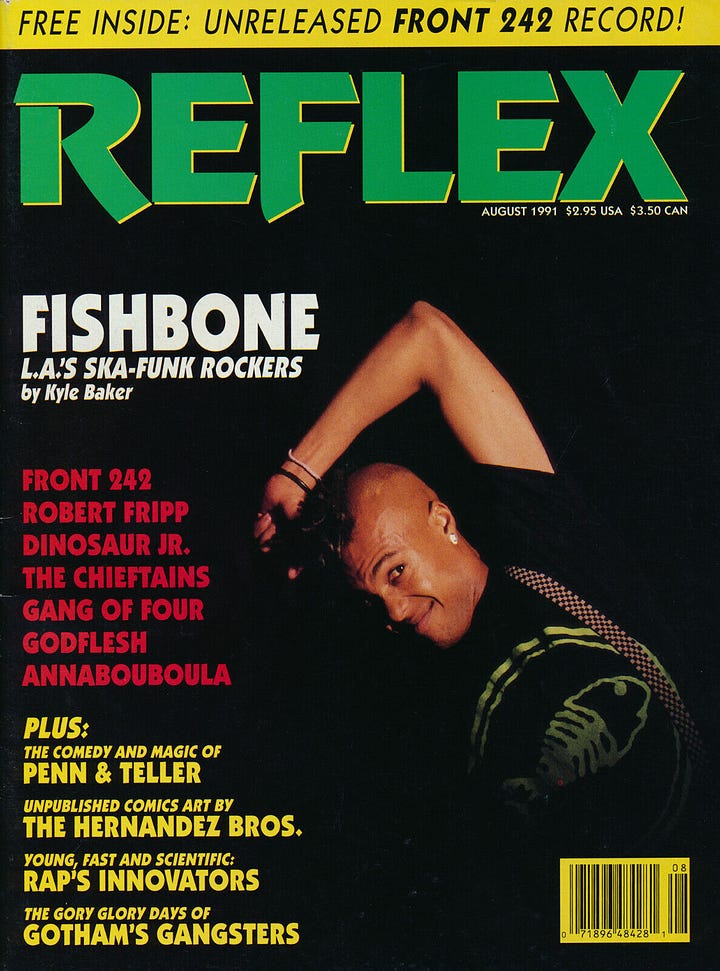

Along with that iconic shirt, other equally biting lines lived in Fishbone music: “All bigotry is like a disease / drowned in the sea” and “Majority, minority, all the same as one.”
In 1993, the year they played the Lollapalooza tour, Fishbone released their fourth studio album Give a Monkey a Brain and He’ll Swear He’s the Center of the Universe. And holy shit, the variety and depth knocked you over.
Their heaviest album yet, the album goes for 15 minutes without any of the horns that seemed to define Fishbone. It was metal. It was dark. “Swim” is grungy. “Servitude” combines dark harmonies and power chords with cerebral lyrics. The third song, “Black Flowers,” is gorgeous and crushing. Written by their keyboardist Chris Dowd, it’s the sound of pain, generational suffering, and a flagging will to live in our hostile world.
Black Flowers have lost their way
They’ve lost their way again
Cursed for their will to dream
Raped by mankind again
Like the auction blocks of castrated dreams
Kills the heart of love turned into disease
And each day I pray
Please take me away
That’s exactly the kind of music us white rock kids in the “alternative era” needed to hear. A break from the moshpit, a moment of racial awakening.
On the fourth song, “Unyielding Conditioning,” the horns come in, but the message stays heady. This is one of my favorite Fishbone songs of all. The melody is catchy. The horns are catchy. The rhythm’s infectious. And Angelo’s singing is filled with nuance and feeling. His vocal range is on full display here, offering proof that he may have been born to sing, but he also put in a lot of work perfecting his artistry and learning to fine tune his many forms of expression.
Angelo didn’t write those lyrics, but the way he sings them, he makes sure they penetrate you.
Unyielding conditioning
Tune out from all that’s happening
Nobody deserves empathy
Nobody feels for meWe’ve all been trained by our worlds.
I cannot see no one but me
No one can feel my emptiness
Everybody must fend for themselves
There is no opennessWe’ve all been claimed by our worlds.
We’ve all been claimed by our worlds.But I have heard of ways
That say there’s light beyond the darkness
And everyone can keep their children warm
And togetherness will guide us safely
Through all stormsUnyielding conditioning
Remove all trace of memory
No one needs justice anymore
No voices raised in angerWe’ve all been tamed by our worlds.
We’ve all been tamed by our worlds.But I have heard of ways
Where people topple all injustice
No one lives their lives on bended knees
And all bigotry is like a disease
Drowned in the sea
And all can hold their head up high
That song absolutely slayed me as an 18-year-old kid.
That is exactly the kind of song I wanted my six-year-old daughter to hear.
Taken as a whole, Reality of My Surroundings and Truth and Soul were my favorite Fishbone albums, but Give A Monkey A Brain… contained some of my favorite Fishbone songs: “They All Have Abandoned Their Hopes” and the buoyant, beautiful love song “Lemon Meringue.”
“Unyielding Conditioning” affected other fans a lot, too. On YouTube, they left comments I deeply related to:
@nowayout8773: “A band that teaches how to live with dignity. FB are amazing writers and musicians.”
@mackymaca: “They might as well been talking ‘bout our times. These guys are musical visionaries.”
@kayaker247247247: “I was a teenager when this album came out. I thought we would be more evolved by now...”
@asiankaos88: “Not only is this song amazing but the lyrics are dead on. A song about how the world just constantly beats you down, Changes who you wanted to be into who you are. That’s why I love this band they didn’t change for anyone.”
@thaddlewis2609: “Some of the best lyrics ever.”
@jedidrummerjake: “Best Ska song ever written!”
Amen.
That’s why I rarely skipped a show when they came through town.
I saw them play throughout the ’90s.
I filmed them play in Portland in 2001.
I saw them play that parking lot in 2009.
I saw them play on their 2022 Holiday Tour.
Kids were there with their parents, and silver-haired mofos in Fishbone ties were there, even older than me. One beautiful thing about aging is how the music of your youth extends across generations now, leaving teenagers dancing and banging their heads beside you under the rainbow of musical time. I only wished my daughter could’ve stayed up for this.
And in 2023, I saw them twice in one day.
After the kids show, tots and parents dispersed, and the band stepped off stage into an empty hall.
Some of those parents had clearly come to see the band for themselves. They danced. They jumped up and down and skanked in place. One dude brought a Fishbone flag that he’d made and waved around. Not all of their kids were as animated as they were, but lots of them were dancing. Anyway, who could blame us middle-aged fans for wanting to see one of the world’s best bands for a measly $10? Taking our kids was part of a musical education. Maybe Fishbone thought of it this way, but an early family show was also a brilliant way to reach a new audience while catering to the middle age crowd whose parental and professional obligations often keep them from staying out late enough to see concerts anymore. This gig was literally way for tired ass middle aged parents to see a show and still get to bed by 10. One dad told me he was psyched because he usually falls asleep on the couch by 9.
The place cleared out.
Keyboardist and singer Chris Dowd stepped off stage and tied his shoe by the wall. I went over to thank him for the show. I told him how awesome it was to finally take my daughter to see them. “Sixteen?” he said. “Damn. That’s cool What’s your name, man? I’m Chris.” We shook hands. He’d been in this band since he was about 15! When I said it was nice to officially meet him, he laughed, like, that’s right, of course you know my name—since 16. “Alright, I’m going to take me a disco nap now,” he said. Was that a touring musician trick? “It’s an old school trick,” he said. “You nap and get all charged back up for going out to the disco. Or, you know, to your own show.” He laughed and went outside to their tour van.
I couldn’t get over that I’d shaken the hand of the person who wrote the song “Black Flowers.” Here he was, just talking to me. Life was crazy.
My daughter and her friends made their way down their narrow stairs to the street outside.
Downstairs, outside the venue, we saw Dirty Walt relaxing their small black tour van, smoking what looked like a cigarillo. So we took a photo with them.
After I thanked him for doing this show, he looked at Viv and her friends, flared his eyes dramatically and he told them, “Alright you kiiiiidz, you all listen to your parents now, you hear?” They just stared at him.
I was dying.
As Viv and I crossed Burnside Street holding hands, she said, “Dad, because it’s a special day and we met that band, can I watch some TV when we get home?" I thought TV??? You just experienced your first big indoor rock show and you can only think about cartoons?!? Not today love, I said. It’s too late, but tomorrow you can.
Fishbone has what producer Steve Albini called “a pure unique mania.” “What I’ve also noticed is that the bands that resonate the most with an audience are the bands that have a pure unique mania about them,” Albini said, “like a very distinctive band, a very distinctive sound, distinctive subject matter, distinctive personalities, that band is going to get an audience that is finely tuned to appreciate that band and will cling to that band for life.”
That was me.
After dinner with my family, I went back the Crystal Ballroom and watched Fishbone play for two hours at the adult show. I got right up front, my chest against the security barrier, and danced the whole time. I’m not that dude who can stand in the back of a show. I need to feel that music in my body and dance up front.
They opened with an updated version of Billie Holiday’s “Strange Fruit,” renamed “Estranged Fruit.” It slayed me.
I got to sleep just after 1am. The next morning while drawing after breakfast, I said, “Vivian, today you can tell your friends at school that you went to a fun show and met this legendary band.”
Vivian said, “Dad, I don’t mean to hurt your feelings or anything, but meeting a band isn’t really that cool to me. I know you like it. I like the music part, though. I’m sorry.”
It’s okay, I said. It’s okay to have different tastes. I’m just glad you can be honest with me. That’s important.
As Angelo said about his musical life: “Optimism, unconditional love, toleration, and forgiveness is the reason why I’m still in Fishbone. And music is the ultimate conductor, it’s the ultimate manipulator. And if you use it to manipulate good, you get a good reaction, if you use it to manipulate bad, you get a bad reaction.”
After brushing her teeth before bed that night, her thoughts returned to Fishbone, though, and she told me, “I thought Dirty Walt was going to be a short clown type person. You know, he gets the crowd excited and jumping, like a clown. But he was taller. And his voice was very deep.”
Goodnight my Fishbone Soldier, goodnight.



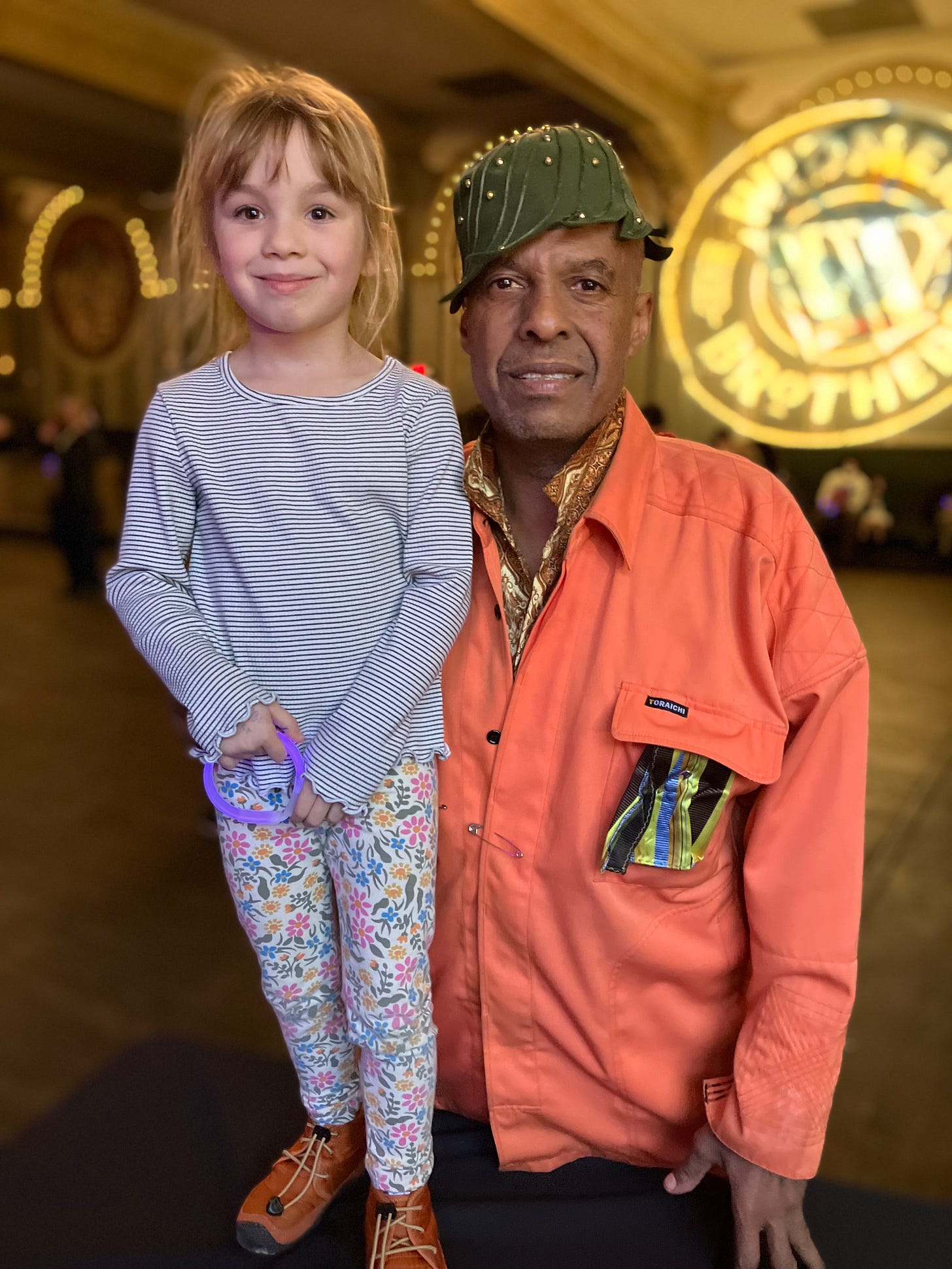

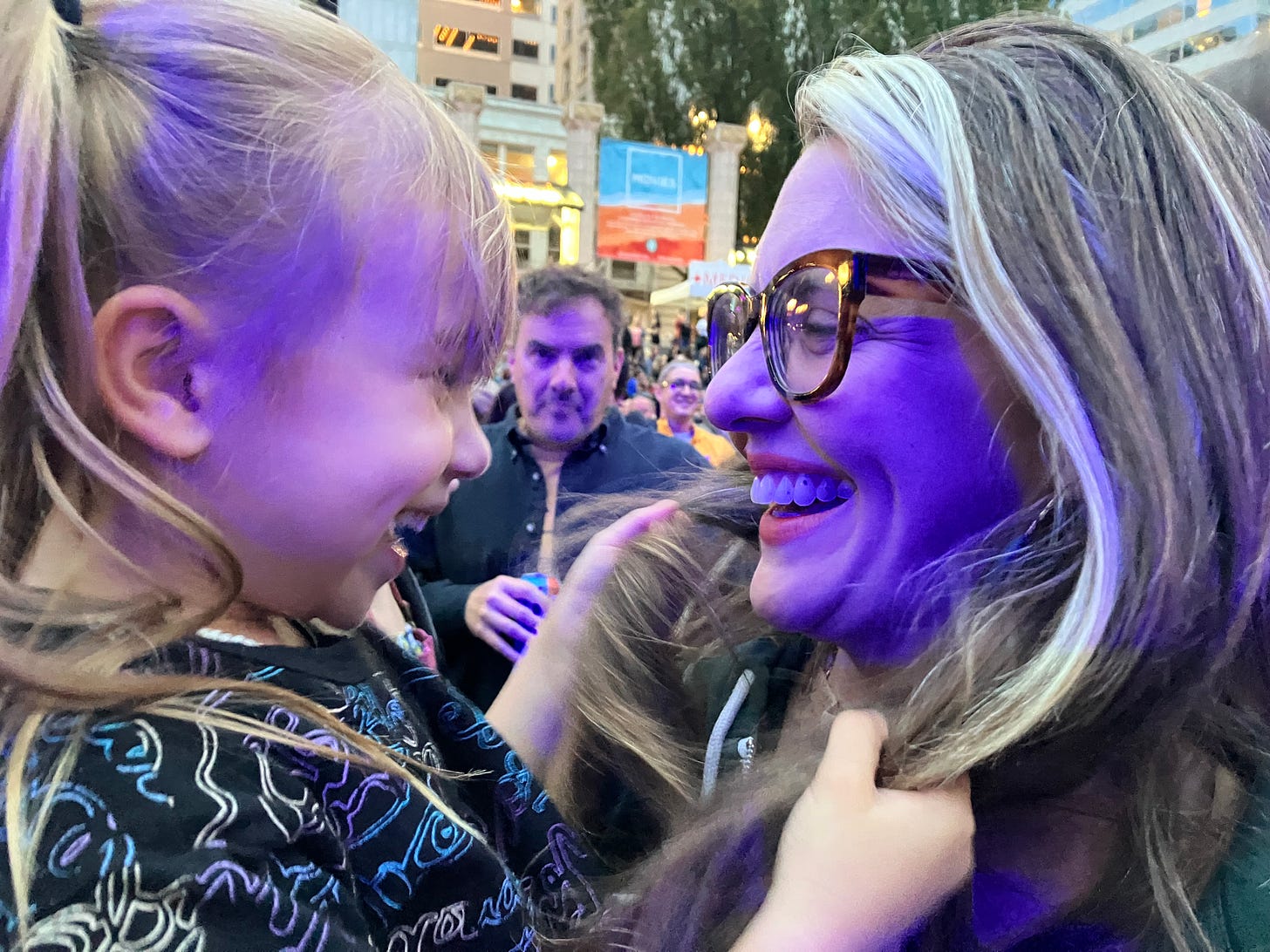
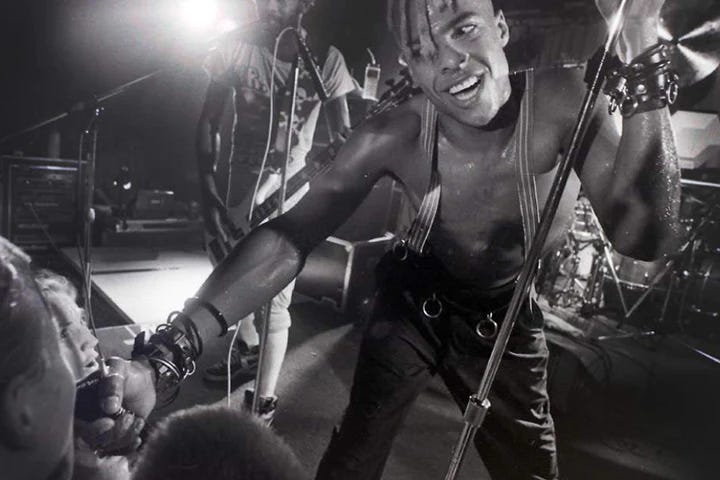
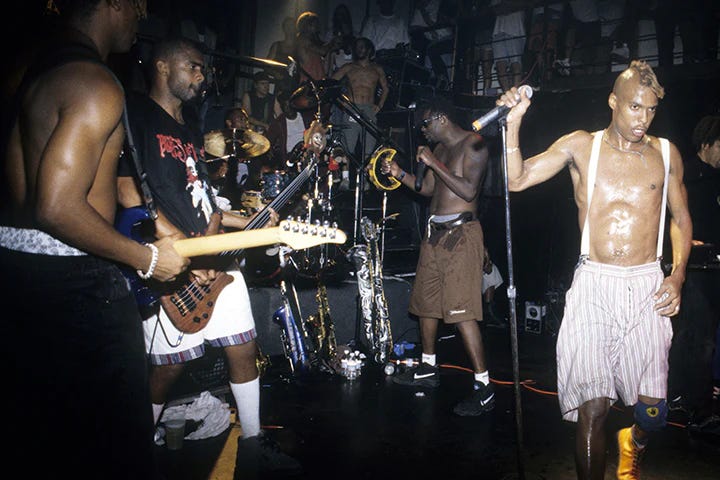

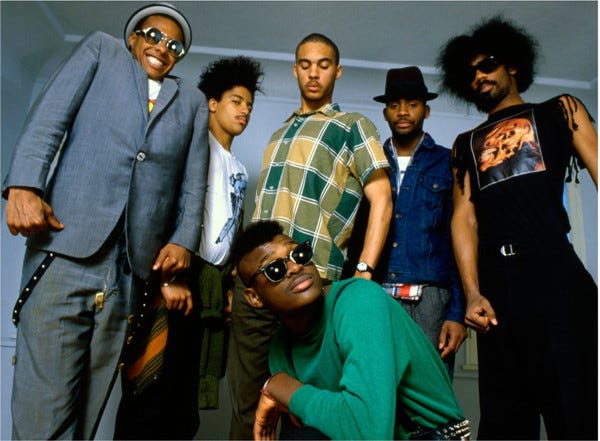
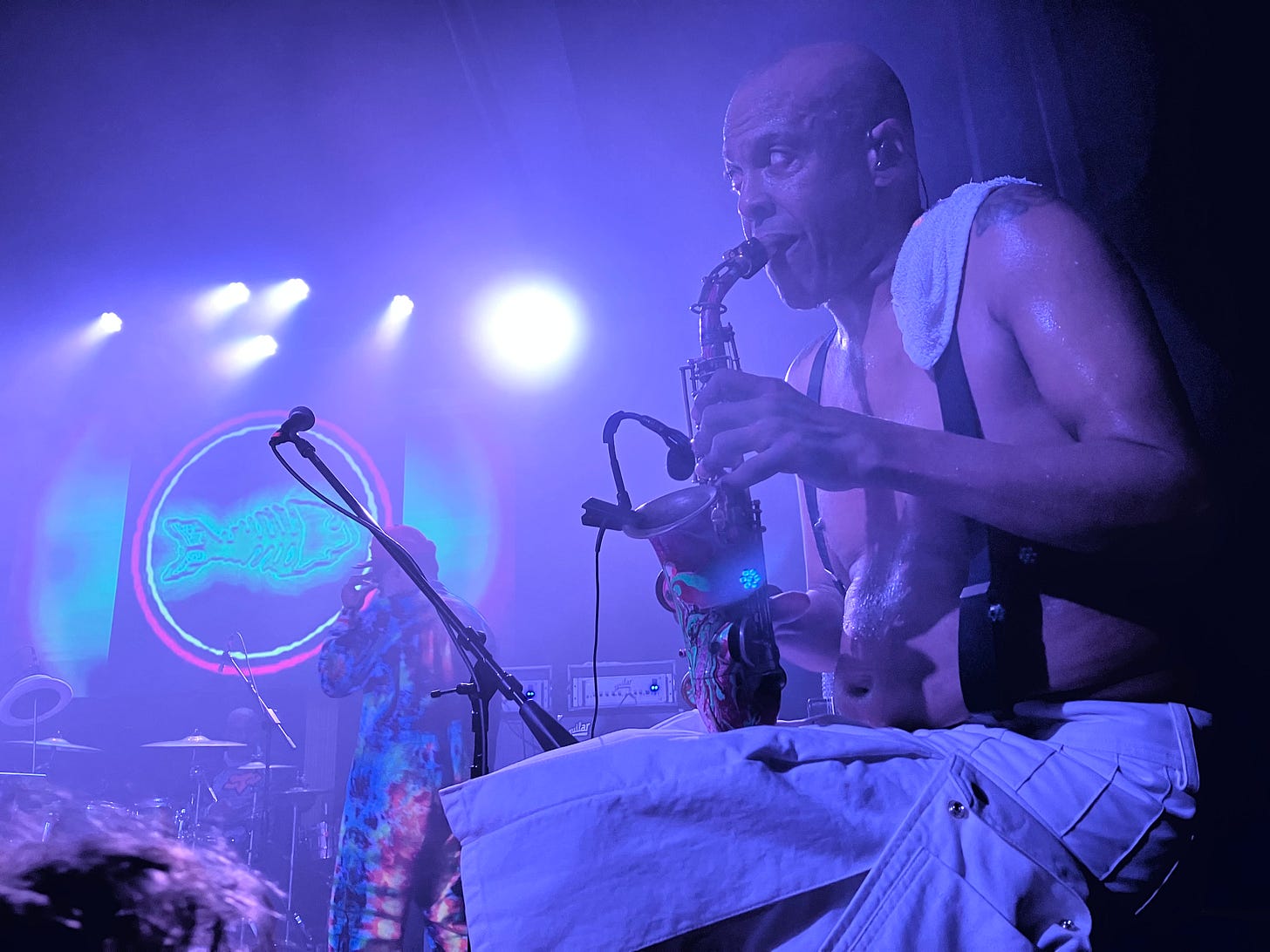

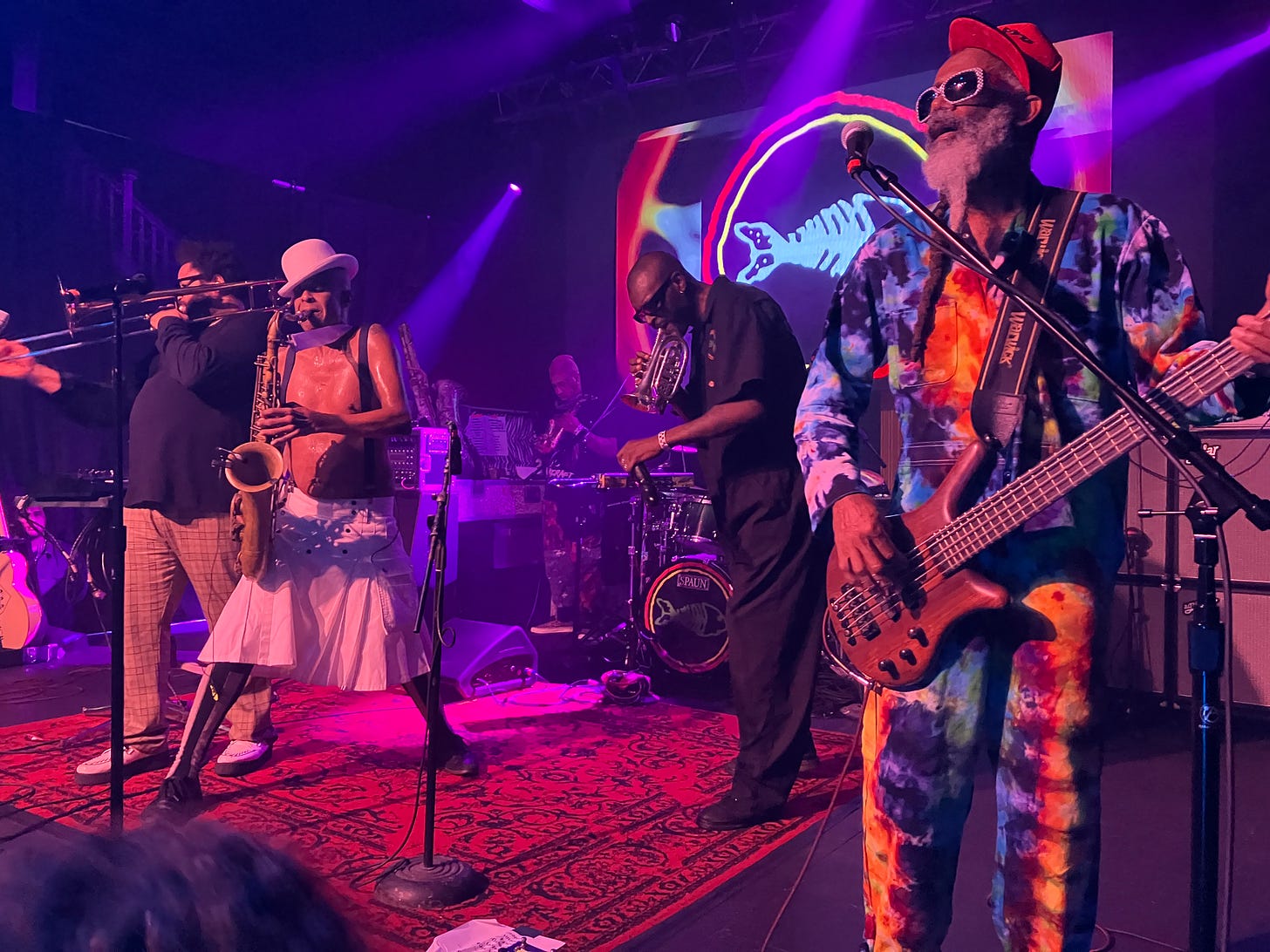
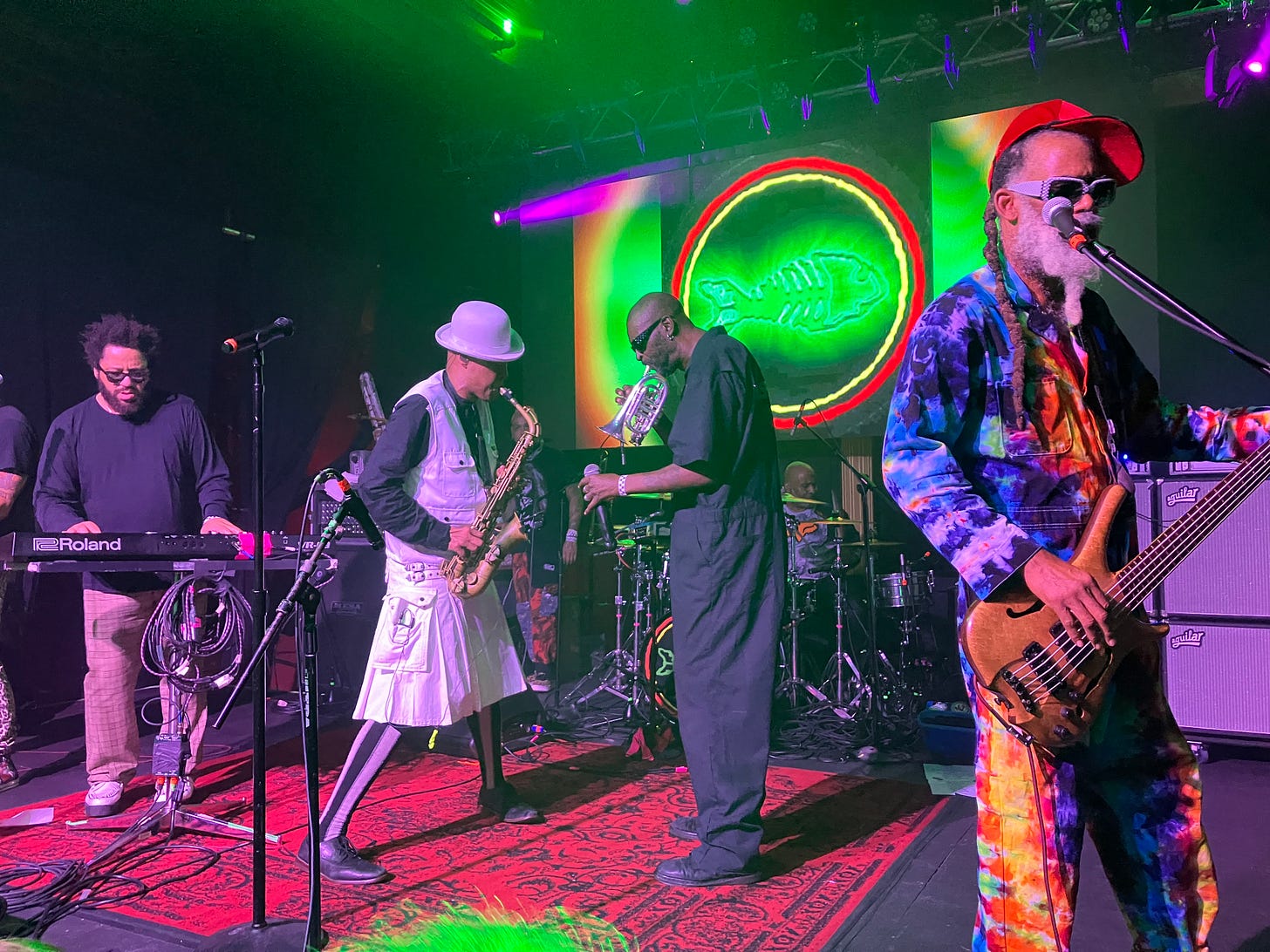
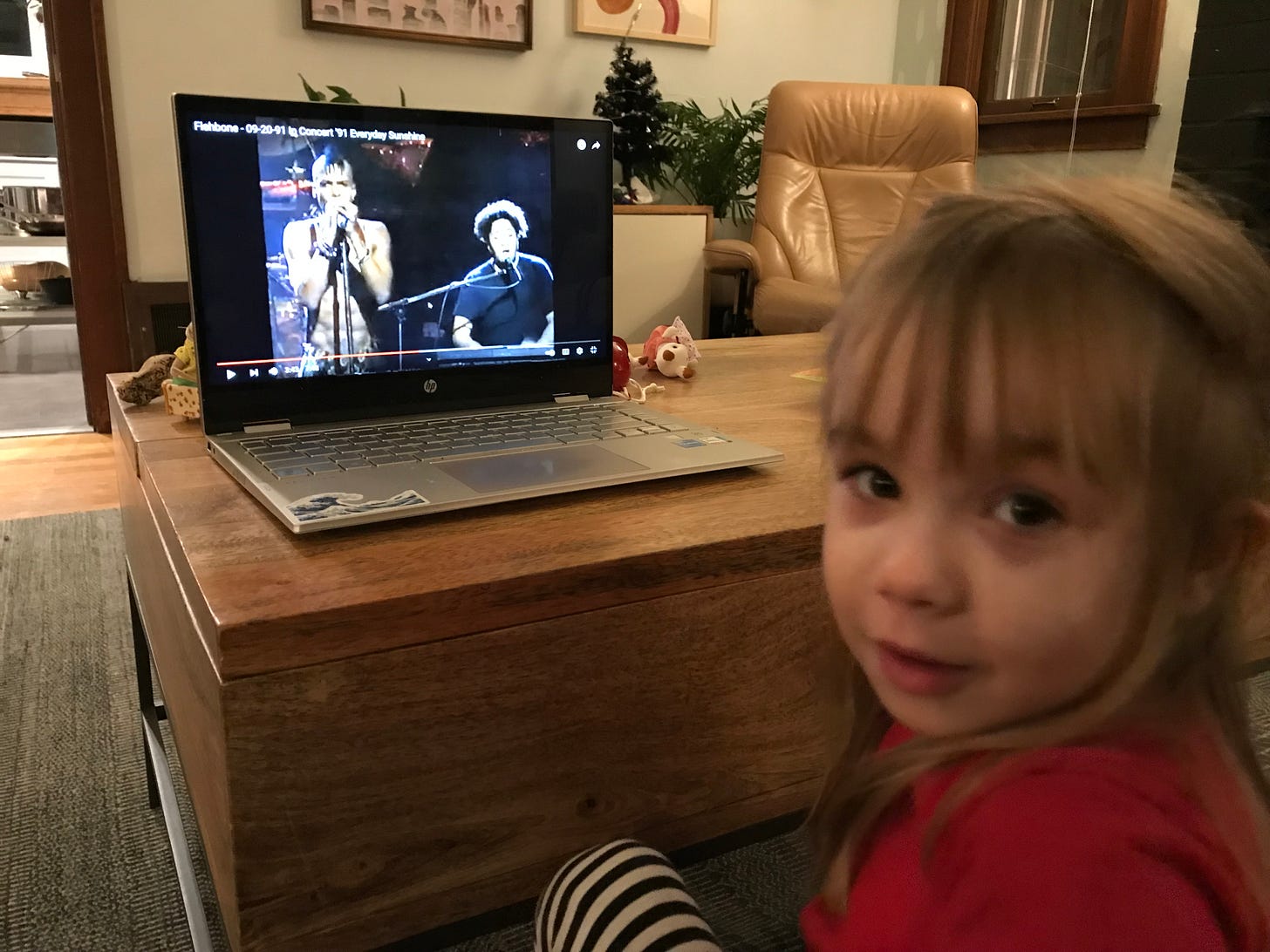
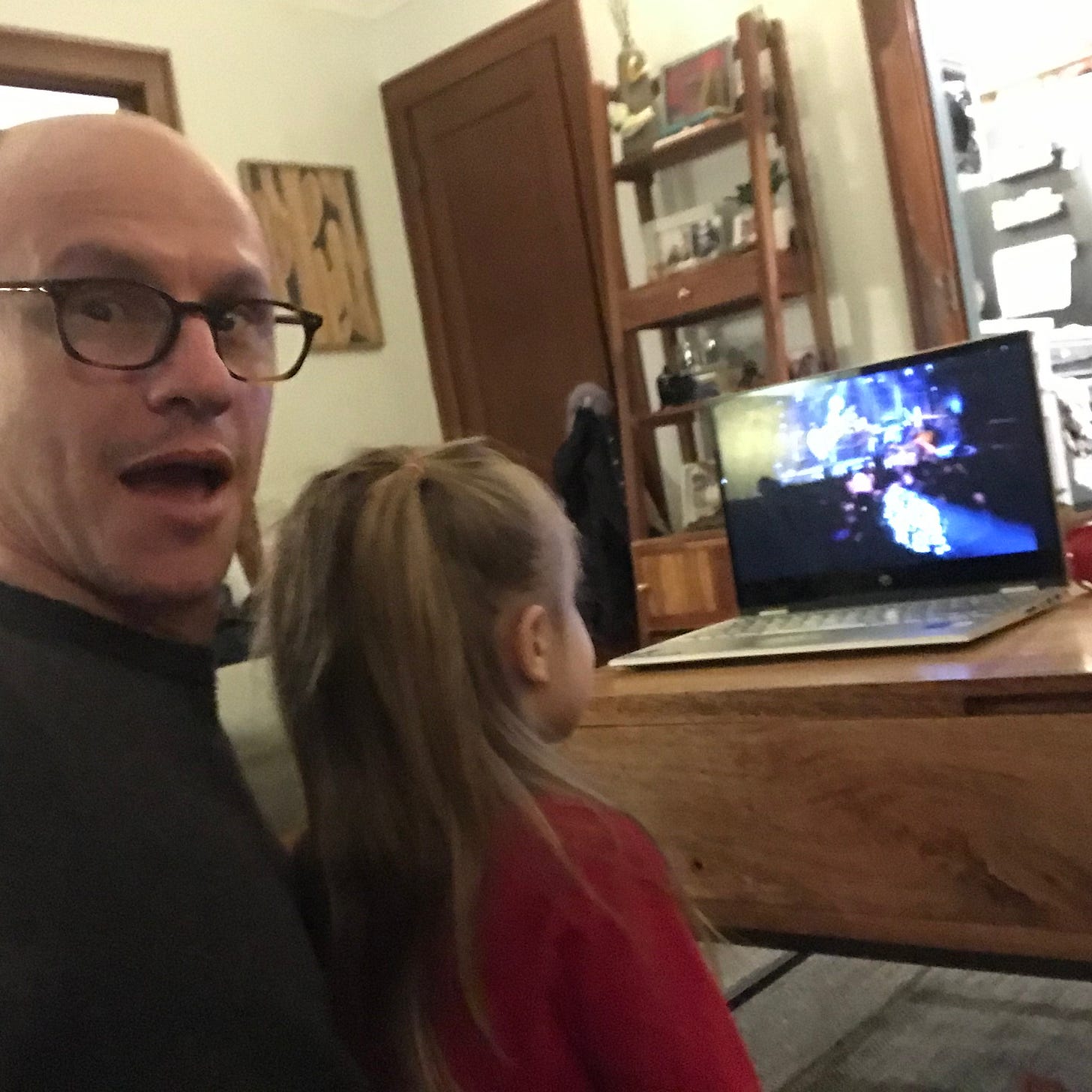
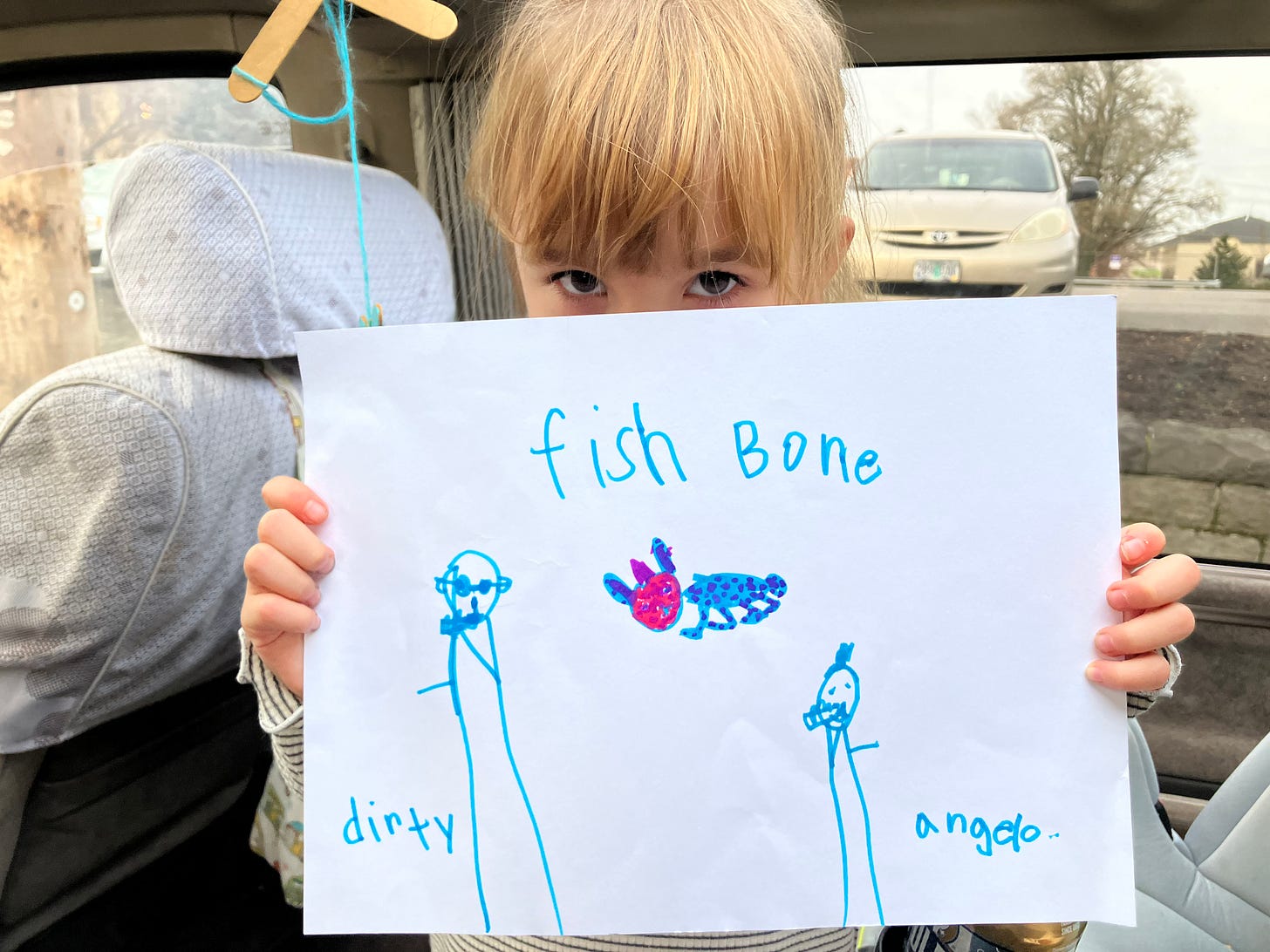






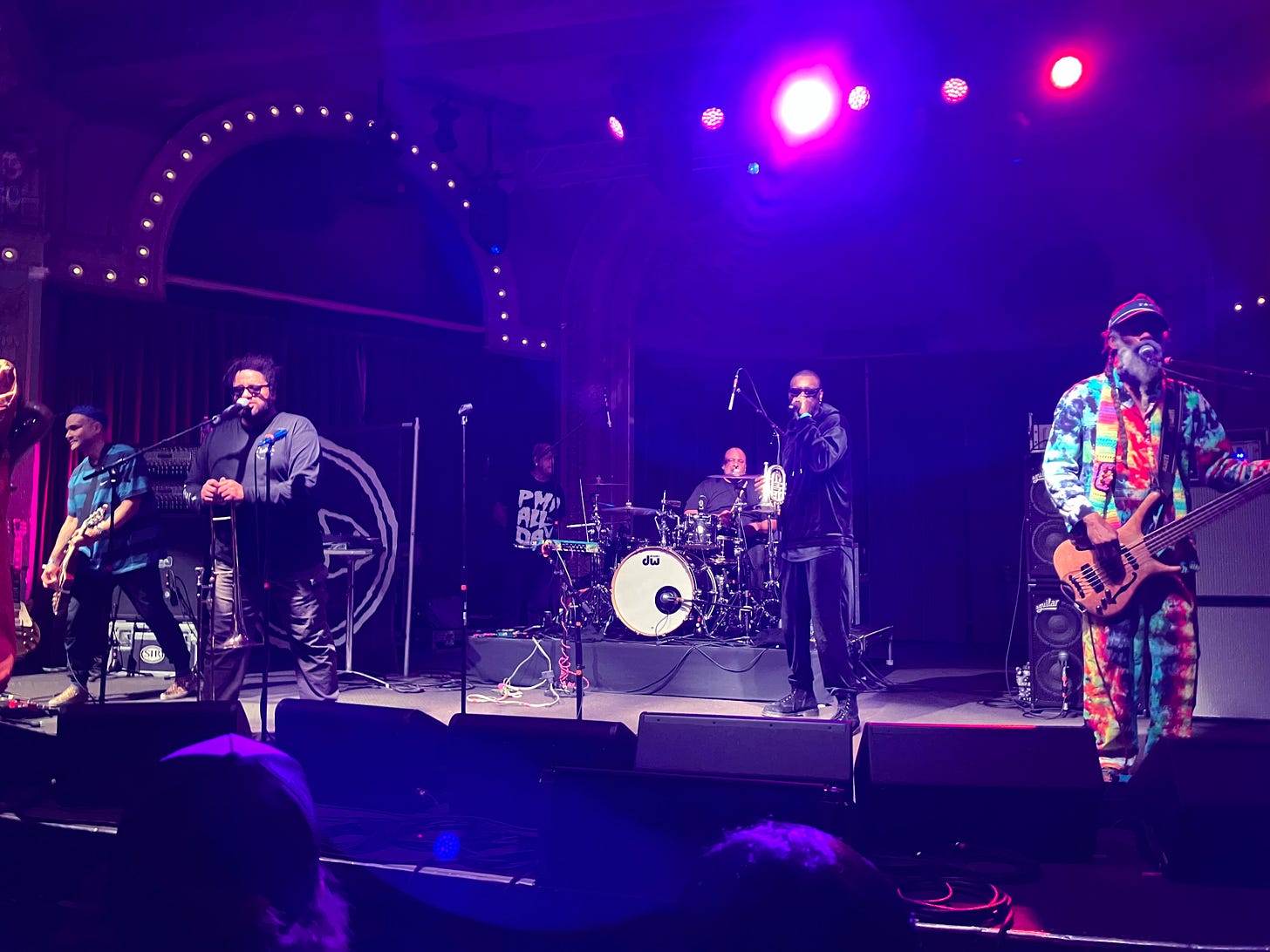

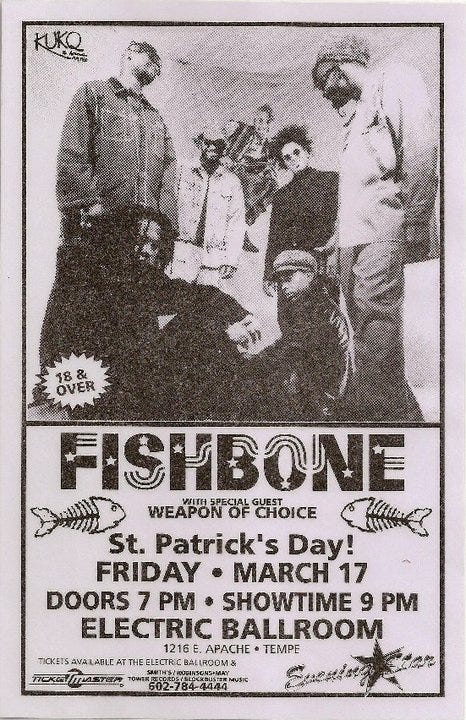


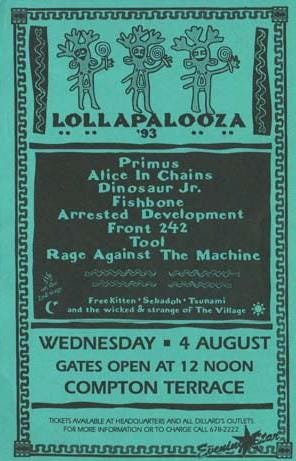
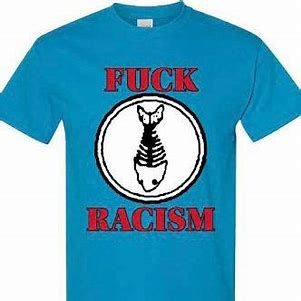
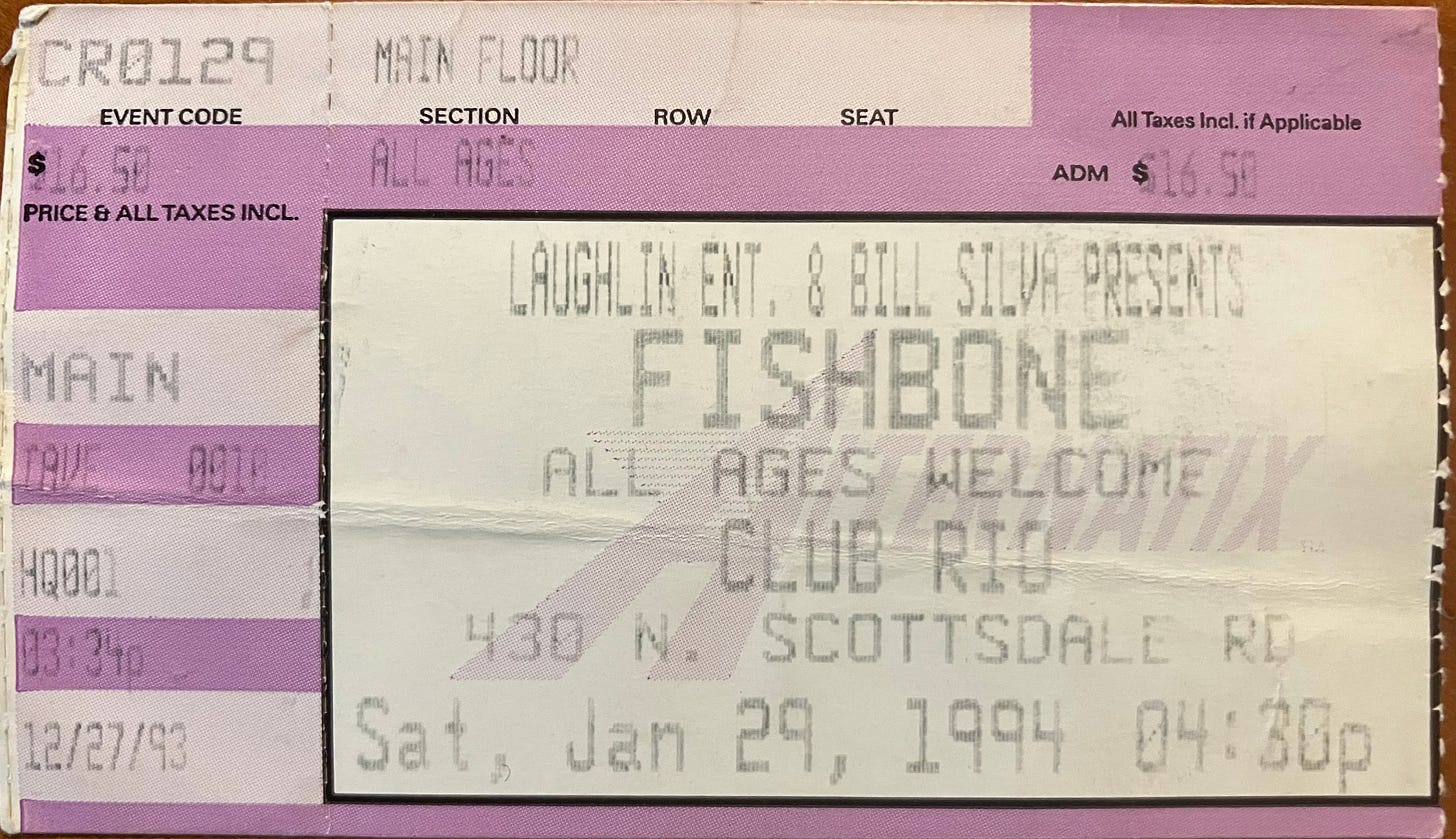
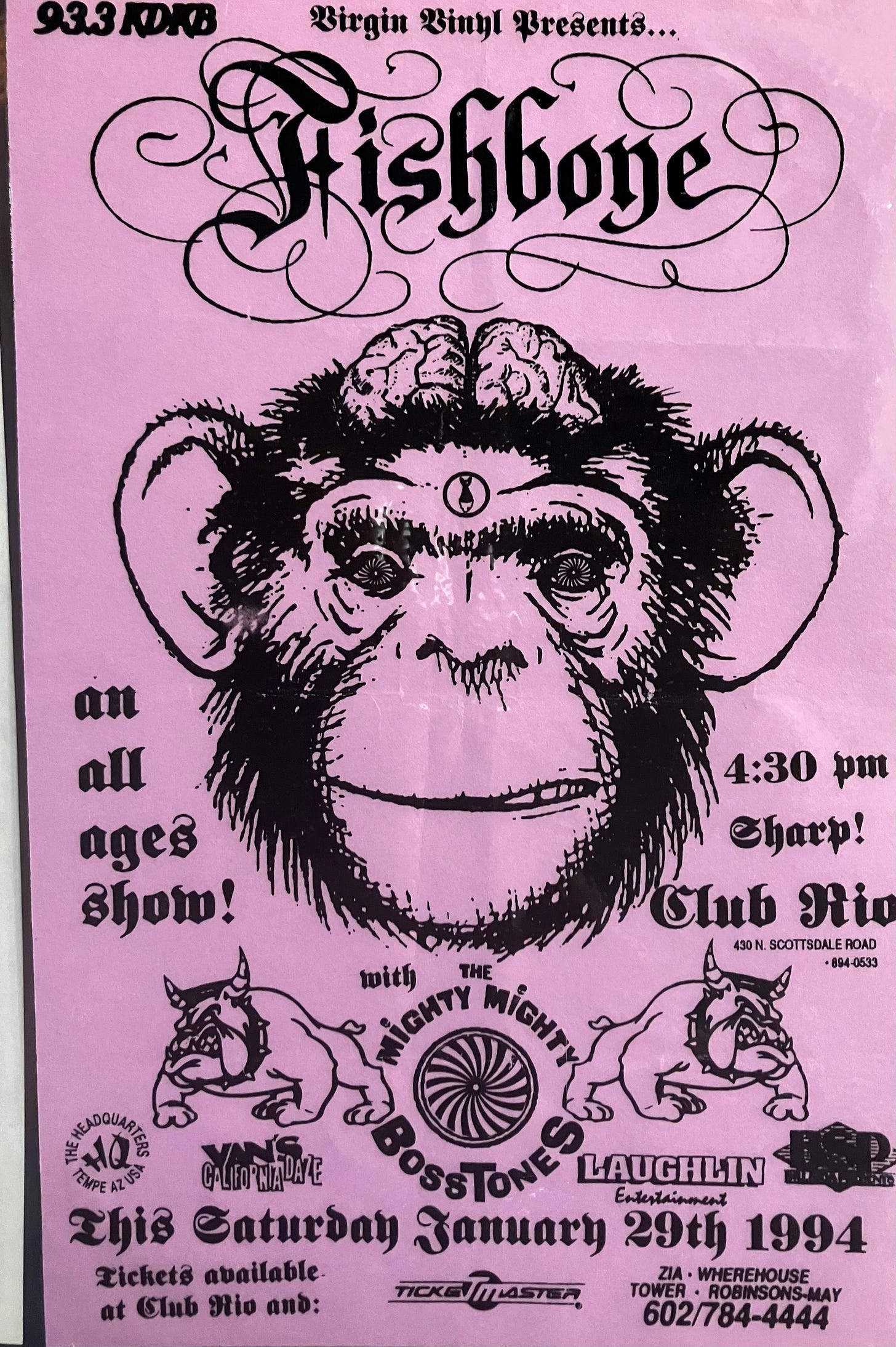


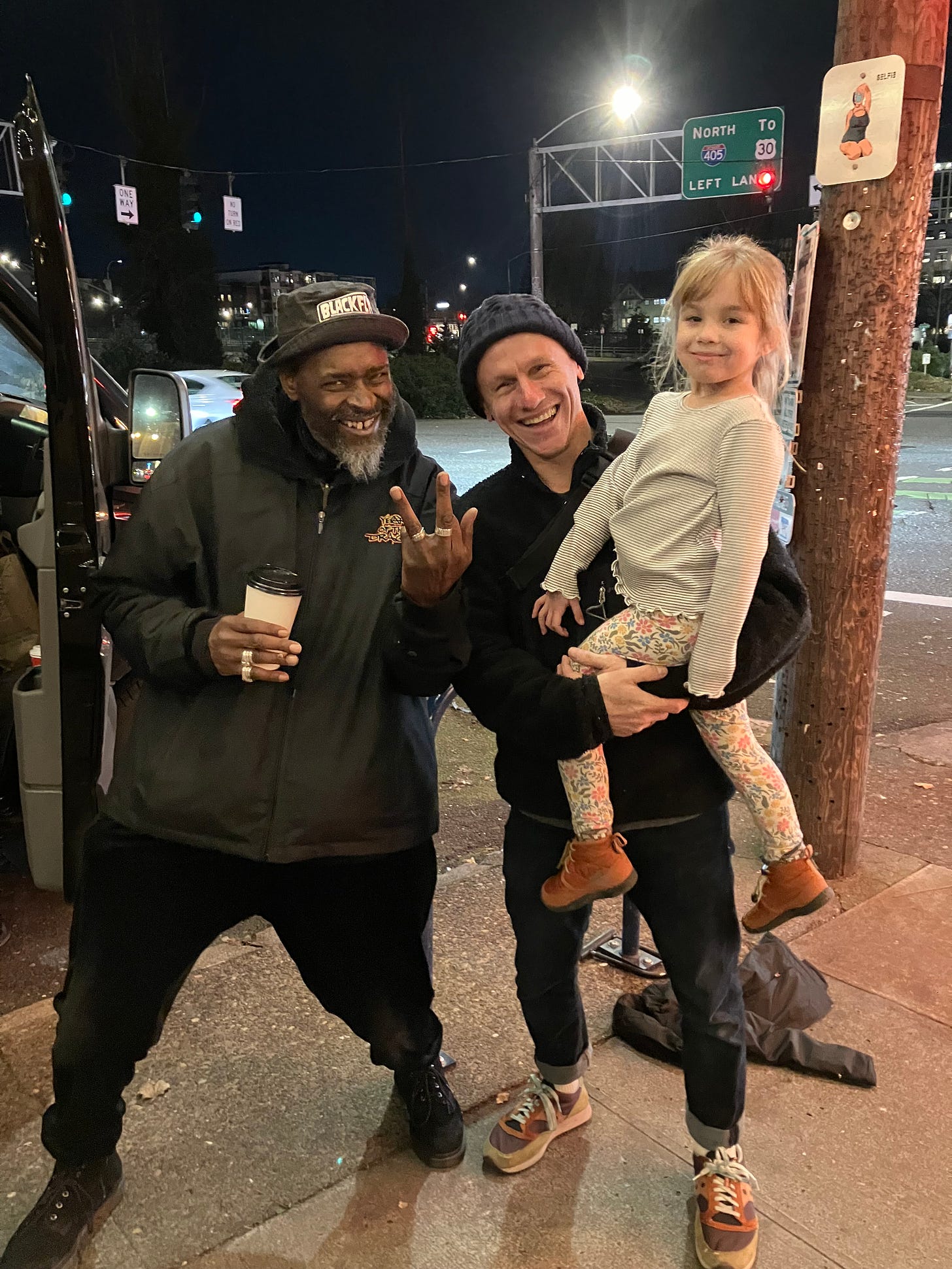


The fact that your daughter can appreciate both this and Taylor Swift gives me hope for the future of music.
I think bands like this are somehow too good for their own good. Lots of people can’t understand what they are doing.
Wow - this was amazing. So many old memories came flooding back. I grew up in So Cal in the 80s and saw Fishbone maybe ten times back then. Like you so perfectly capture, they are one of the great live bands of all time. I loved reading about taking your daughter to see them play a matinee and all the great photos you took. Love the artwork she made and gave to Angelo!
I could go on and on, but I'll just mention one show, back in '88 I think, when Public Enemy opened for Fishbone. And opening for both of them were Living Color and Stetsasonic. Insane quadruple bill. I just looked it up, it was Dec. 17, 1988 at the Santa Monica Civic. I was 21. It was a crazy show. I had seen Fishbone probably five times by then, was aware of Angelo's crowd surfing antics.
Prior shows skewed more caucasian -- I think that "Party at Ground Zero" which played on KROQ led Fishbone to have a whiter fan base than most black artists. In addition to the genre blending qualities you describe in your piece. Anyway, when Public Enemy started, the energy in the crowd turned aggressive and fights started breaking out. You could literally see the crowd segregate, with the white folks moving to the back. It was intense. P.E. ended up cutting their set short after trying to calm the crowd several times.
When Fishbone started, the mood was still tense. Angelo talked about the power of music to unite and within a couple songs the party vibe had returned, mostly. But there was no way Angelo was going to crowd surf tonight, right? Wrong. I won't lie that I didn't worry for his safety as he was carried on the hands of the crowd, many of who I was pretty sure had never seen Fishbone before. He even made it to the back, where I was, and when he stood himself up, he was right beside me, sweaty and singing in my face. I was in awe.
When the Fishbone documentary, Everyday Sunshine, was released, Angelo and Norwood appeared at a screening in San Francisco that I attended. They performed a short acoustic set of bass/guitar sax and theremin. Angelo had been obsessed with the theremin and I loved how odd and unexpected the performance was. I wrote about it a long time ago for my pre-Substack blog. You can read it and see a blurry pic here:
https://fuzzyswarbles.wordpress.com/2012/01/07/fishbone-doc-at-roxie-theater-sf/
Again, great piece. I've bookmarked it so I can watch the many links you shared.